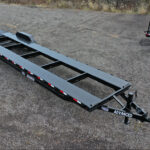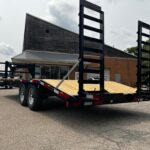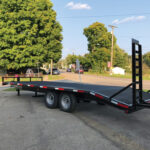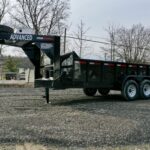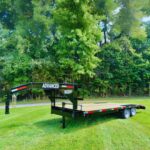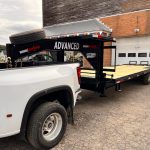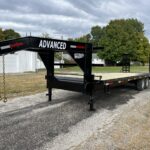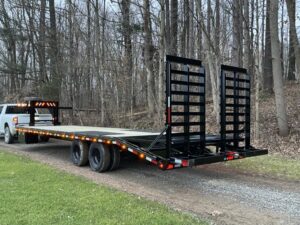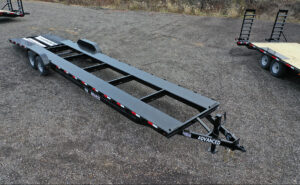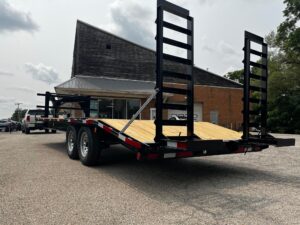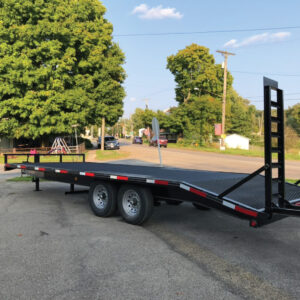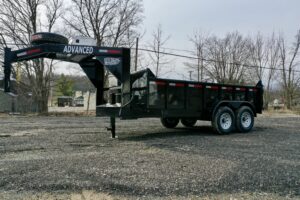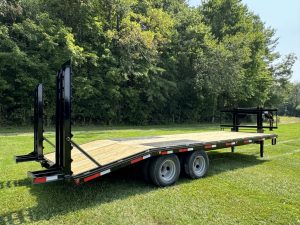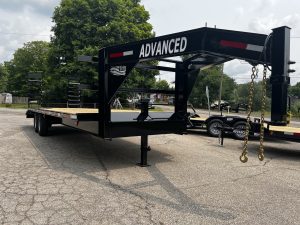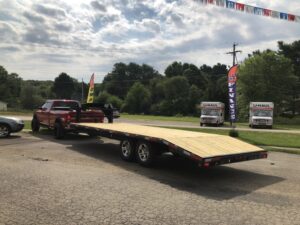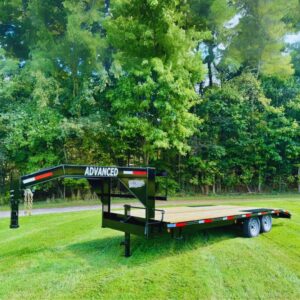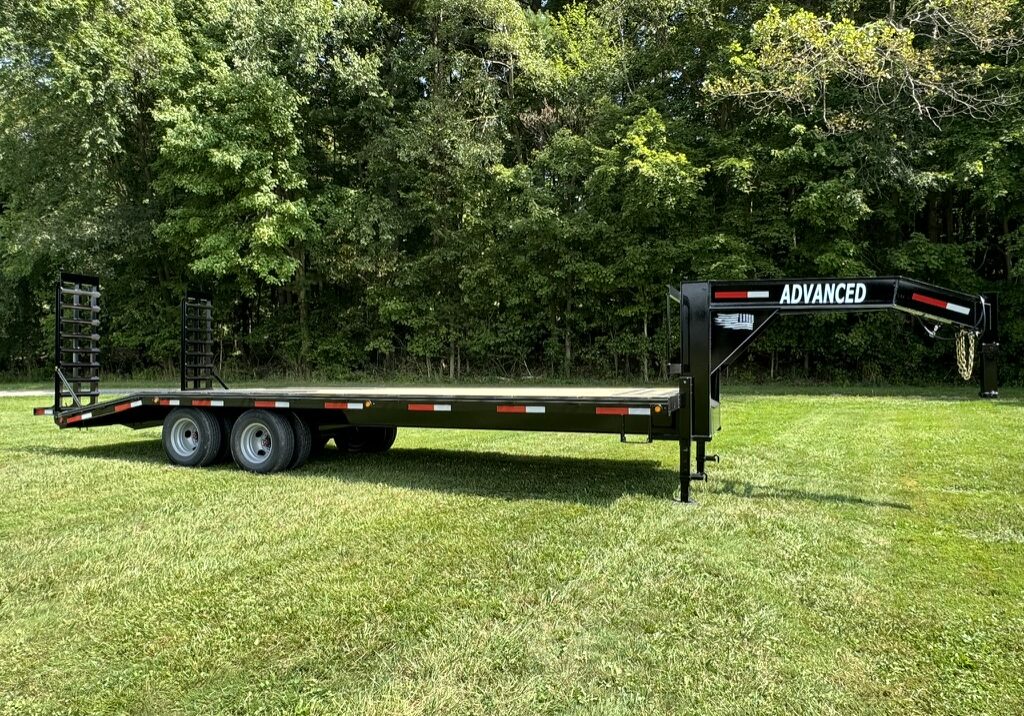
20 ft Flatbed Trailers: Specs, Uses & Buying Tips
A 20 ft flatbed trailer delivers the right balance of hauling capacity and maneuverability for medium-duty transport needs. These versatile trailers feature an open deck design that accommodates oversized equipment, construction materials, and vehicles that won’t fit in enclosed trailers.
Design and Construction
The typical 20 ft flatbed trailer features a heavy-duty steel frame with a treated wood or steel deck measuring 240 inches in length and up to 102 inches in width (the legal maximum). Most trailers in this category offer GVWR ratings between 9,900 and 12,000 pounds, with payload capacities ranging from 9,500 to 12,000 pounds depending on the specific model and axle configuration.
Key features include tandem axles for optimal load distribution, LED lighting systems for enhanced safety, stake pockets for securing cargo, and heavy-duty fenders that protect against road debris. Many models incorporate slide-in ramps for loading wheeled equipment and vehicles efficiently.
Applications and Use Cases
These trailers excel in construction, landscaping, and equipment transport applications. Contractors frequently use them to haul mini excavators, skid-steers, and building materials to job sites. The open deck design allows forklifts and cranes to load and unload items from multiple angles, making them ideal for businesses that require flexible loading solutions.
Popular cargo includes:
- Construction equipment and machinery
- Lumber, steel beams, and building materials
- Landscaping equipment and bulk materials
- Vehicles, ATVs, and recreational equipment
- Palletized goods and general freight
Purchasing vs Renting Considerations
For businesses with regular hauling needs, purchasing a 20 ft flatbed trailer often proves cost-effective. Companies should evaluate their annual usage patterns and consider factors like storage, maintenance, and insurance costs. Trailers for sale typically range from basic utility models to heavy-duty equipment haulers with specialized features.
Renting becomes the right choice for occasional users or businesses testing their hauling requirements. Rental options provide access to well-maintained trailers without the long-term commitment, making them ideal for seasonal work or specific projects.
Safety and Security Features
Modern 20 ft flatbed trailers incorporate numerous safety features including breakaway systems, reflective tape, and DOT-compliant lighting. Proper cargo securement using chains, straps, and the trailer’s built-in tie-down points is essential for safe transport. Many models offer upgraded brake systems and safety chains rated for the trailer’s GVWR.
Security features vary by manufacturer but may include lockable tongue couplers and optional GPS tracking systems. When hauling valuable equipment, operators should consider additional security measures like wheel locks or storage in secured facilities.
Specifications and Compatibility
The standard deck width of 8.5 feet accommodates most equipment while remaining street-legal. Deck height typically ranges from 26 to 32 inches, affecting ground clearance and loading ease. Most 20 ft trailers use either a 2-5/16 inch coupler for bumper-pull applications or a pintle hitch for heavier-duty towing.
Towing vehicle requirements depend on the loaded trailer weight. A 3/4-ton or 1-ton pickup truck typically provides adequate capacity for most applications, though operators should verify their vehicle’s towing capacity and ensure proper weight distribution.
Choosing the Right Model
Selecting the appropriate 20 ft flatbed trailer requires matching the trailer’s specifications to your specific hauling needs. Consider the maximum weight of items you’ll transport, required deck features like ramps or stake pockets, and your towing vehicle’s capabilities.
Business owners should evaluate build quality, warranty coverage, and local dealer support when comparing products. The right trailer will offer years of reliable service while meeting safety regulations and operational requirements efficiently.
EXPLORE MORE
RELATED ARTICLES
Top 5th Wheel Flatbed Trailer Models Available Today
Need a reliable 5th wheel flatbed trailer for heavy-duty hauling? This guide covers top models, key features, and what to consider when choosing the best trailer for your needs. Key Takeaways Discover Our Premium 5th Wheel Flatbed Trailers Advanced Trailer MFG takes pride in offering a range of high-quality flatbed…
Read More...Multiple Car Hauler Trailer: Complete Guide to Multi-Vehicle Transport Solutions
Expert Multiple Car Hauler Trailer Services and Solutions Transform your vehicle transport capabilities with professional car hauler trailers designed to haul multiple cars efficiently and safely. Get Your Multiple Car Hauler Quote Today! Why Multiple Car Hauler Trailers Are Essential for Your Business Multiple car hauler trailers maximize efficiency by…
Read More...Flatbed Car Trailers for Sale: Professional Grade Solutions for Vehicle Transport
Finding the right flatbed car trailer means matching your specific hauling needs with proven engineering and reliable performance. Whether you’re transporting classic cars to shows, moving inventory between dealerships, or hauling heavy equipment across uneven terrain, the right trailer makes every job safer and more efficient. Why Choose Flatbed Car…
Read More...Best Flat Bed Trailers for Sale | Top Deals to Enhance Your Hauling
Need a flatbed trailer for your hauling needs? This article will guide you through the types, features, and considerations for choosing the right trailers flat bed. Learn what to look for and make an informed choice. Key Takeaways Explore Our Range of Flatbed Trailers Our comprehensive selection of flatbed trailers…
Read More...Gooseneck or Bumper Pull: Which Trailer is Best for You?
Trying to choose between a gooseneck or bumper pull trailer? This article explains the differences and helps you decide which is best for your needs. Key Takeaways Understanding Trailer Types When it comes to towing, two primary trailer types dominate the market: bumper pull and gooseneck trailers. These two options…
Read More...Top Picks for Your Custom Built Trailer Needs
Looking for a trailer that fits your specific needs? A custom built trailer might be the answer. In this article, you’ll learn the benefits of custom trailers, explore various customization options, and discover different types available. See how a custom trailer can meet your needs perfectly. Key Takeaways Why Choose…
Read More...Flat Trailer Solutions Built For The Long Haul
A flat trailer offers a reliable way to transport large, heavy loads. This article covers what flat trailers are, their benefits, and available options to help you choose the best one for your needs. Key Takeaways High-Quality Flatbed Trailers for All Your Hauling Needs Built with reliable and durable parts,…
Read More...Gooseneck or Bumper Pull: Which Trailer is Best for You?
Trying to choose between a gooseneck or bumper pull trailer? This article explains the differences and helps you decide which is best for your needs. Key Takeaways Understanding Trailer Types When it comes to towing, two primary trailer types dominate the market: bumper pull and gooseneck trailers. These two options…
Read More...Top-Rated Gooseneck Flatbed Trailer Options for Your Hauling Needs
Top-Rated Gooseneck Flatbed Trailer Options for Your Hauling Needs A gooseneck flatbed trailer excels at heavy-duty hauling, offering superior stability by attaching to the truck bed. Ideal for transporting equipment or livestock, this guide covers top-rated options, key features, and tips for choosing the right model. Key Takeaways Gooseneck flatbed…
Read More...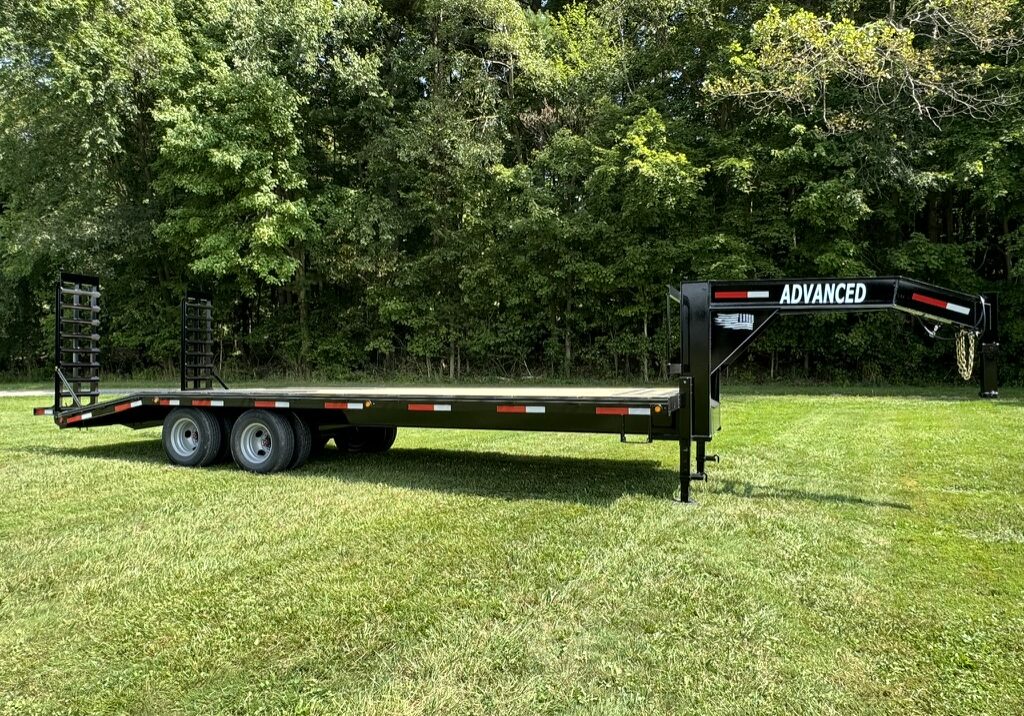
20 ft Flatbed Trailers: Specs, Uses & Buying Tips
A 20 ft flatbed trailer delivers the right balance of hauling capacity and maneuverability for medium-duty transport needs. These versatile trailers feature an open deck design that accommodates oversized equipment, construction materials, and vehicles that won’t fit in enclosed trailers.
Design and Construction
The typical 20 ft flatbed trailer features a heavy-duty steel frame with a treated wood or steel deck measuring 240 inches in length and up to 102 inches in width (the legal maximum). Most trailers in this category offer GVWR ratings between 9,900 and 12,000 pounds, with payload capacities ranging from 9,500 to 12,000 pounds depending on the specific model and axle configuration.
Key features include tandem axles for optimal load distribution, LED lighting systems for enhanced safety, stake pockets for securing cargo, and heavy-duty fenders that protect against road debris. Many models incorporate slide-in ramps for loading wheeled equipment and vehicles efficiently.
Applications and Use Cases
These trailers excel in construction, landscaping, and equipment transport applications. Contractors frequently use them to haul mini excavators, skid-steers, and building materials to job sites. The open deck design allows forklifts and cranes to load and unload items from multiple angles, making them ideal for businesses that require flexible loading solutions.
Popular cargo includes:
- Construction equipment and machinery
- Lumber, steel beams, and building materials
- Landscaping equipment and bulk materials
- Vehicles, ATVs, and recreational equipment
- Palletized goods and general freight
Purchasing vs Renting Considerations
For businesses with regular hauling needs, purchasing a 20 ft flatbed trailer often proves cost-effective. Companies should evaluate their annual usage patterns and consider factors like storage, maintenance, and insurance costs. Trailers for sale typically range from basic utility models to heavy-duty equipment haulers with specialized features.
Renting becomes the right choice for occasional users or businesses testing their hauling requirements. Rental options provide access to well-maintained trailers without the long-term commitment, making them ideal for seasonal work or specific projects.
Safety and Security Features
Modern 20 ft flatbed trailers incorporate numerous safety features including breakaway systems, reflective tape, and DOT-compliant lighting. Proper cargo securement using chains, straps, and the trailer’s built-in tie-down points is essential for safe transport. Many models offer upgraded brake systems and safety chains rated for the trailer’s GVWR.
Security features vary by manufacturer but may include lockable tongue couplers and optional GPS tracking systems. When hauling valuable equipment, operators should consider additional security measures like wheel locks or storage in secured facilities.
Specifications and Compatibility
The standard deck width of 8.5 feet accommodates most equipment while remaining street-legal. Deck height typically ranges from 26 to 32 inches, affecting ground clearance and loading ease. Most 20 ft trailers use either a 2-5/16 inch coupler for bumper-pull applications or a pintle hitch for heavier-duty towing.
Towing vehicle requirements depend on the loaded trailer weight. A 3/4-ton or 1-ton pickup truck typically provides adequate capacity for most applications, though operators should verify their vehicle’s towing capacity and ensure proper weight distribution.
Choosing the Right Model
Selecting the appropriate 20 ft flatbed trailer requires matching the trailer’s specifications to your specific hauling needs. Consider the maximum weight of items you’ll transport, required deck features like ramps or stake pockets, and your towing vehicle’s capabilities.
Business owners should evaluate build quality, warranty coverage, and local dealer support when comparing products. The right trailer will offer years of reliable service while meeting safety regulations and operational requirements efficiently.
EXPLORE MORE
RELATED ARTICLES
Top 5th Wheel Flatbed Trailer Models Available Today
Need a reliable 5th wheel flatbed trailer for heavy-duty hauling? This guide covers top models, key features, and what to consider when choosing the best trailer for your needs. Key Takeaways Discover Our Premium 5th Wheel Flatbed Trailers Advanced Trailer MFG takes pride in offering a range of high-quality flatbed…
Read More...Multiple Car Hauler Trailer: Complete Guide to Multi-Vehicle Transport Solutions
Expert Multiple Car Hauler Trailer Services and Solutions Transform your vehicle transport capabilities with professional car hauler trailers designed to haul multiple cars efficiently and safely. Get Your Multiple Car Hauler Quote Today! Why Multiple Car Hauler Trailers Are Essential for Your Business Multiple car hauler trailers maximize efficiency by…
Read More...Flatbed Car Trailers for Sale: Professional Grade Solutions for Vehicle Transport
Finding the right flatbed car trailer means matching your specific hauling needs with proven engineering and reliable performance. Whether you’re transporting classic cars to shows, moving inventory between dealerships, or hauling heavy equipment across uneven terrain, the right trailer makes every job safer and more efficient. Why Choose Flatbed Car…
Read More...Best Flat Bed Trailers for Sale | Top Deals to Enhance Your Hauling
Need a flatbed trailer for your hauling needs? This article will guide you through the types, features, and considerations for choosing the right trailers flat bed. Learn what to look for and make an informed choice. Key Takeaways Explore Our Range of Flatbed Trailers Our comprehensive selection of flatbed trailers…
Read More...Gooseneck or Bumper Pull: Which Trailer is Best for You?
Trying to choose between a gooseneck or bumper pull trailer? This article explains the differences and helps you decide which is best for your needs. Key Takeaways Understanding Trailer Types When it comes to towing, two primary trailer types dominate the market: bumper pull and gooseneck trailers. These two options…
Read More...Top Dual Tandem Trailer Options for Heavy-Duty Hauling
Searching for a trailer that can handle heavy-duty loads? Look no further than a dual tandem trailer. Known for their stability and durability, dual tandem trailers are built to manage the most demanding hauling tasks. In this article, we’ll cover what makes these trailers stand out, key features to look…
Read More...Top 10k Gooseneck Trailer Options for Heavy-Duty Hauling
Searching for the best 10k gooseneck trailer for heavy-duty hauling? This article covers top options, essential features, and what to consider when choosing the right trailer. Get ready to find out which models can handle your toughest tasks efficiently. Key Takeaways 10k Gooseneck Trailer Overview 10k gooseneck trailers are renowned…
Read More...Top Flat Deck Trailer Options | Best Deals & Features
Flat deck trailers are perfect for hauling oversized or heavy loads. They transport construction materials, vehicles, and other large items efficiently. This guide explores top flat deck trailer options, key features, and how to choose the right one for your needs. Key Takeaways Discover the Best Flat Deck Trailers Flatbed…
Read More...Top Picks for Your Custom Built Trailer Needs
Looking for a trailer that fits your specific needs? A custom built trailer might be the answer. In this article, you’ll learn the benefits of custom trailers, explore various customization options, and discover different types available. See how a custom trailer can meet your needs perfectly. Key Takeaways Why Choose…
Read More...Flat Trailer Solutions Built For The Long Haul
A flat trailer offers a reliable way to transport large, heavy loads. This article covers what flat trailers are, their benefits, and available options to help you choose the best one for your needs. Key Takeaways High-Quality Flatbed Trailers for All Your Hauling Needs Built with reliable and durable parts,…
Read More...

